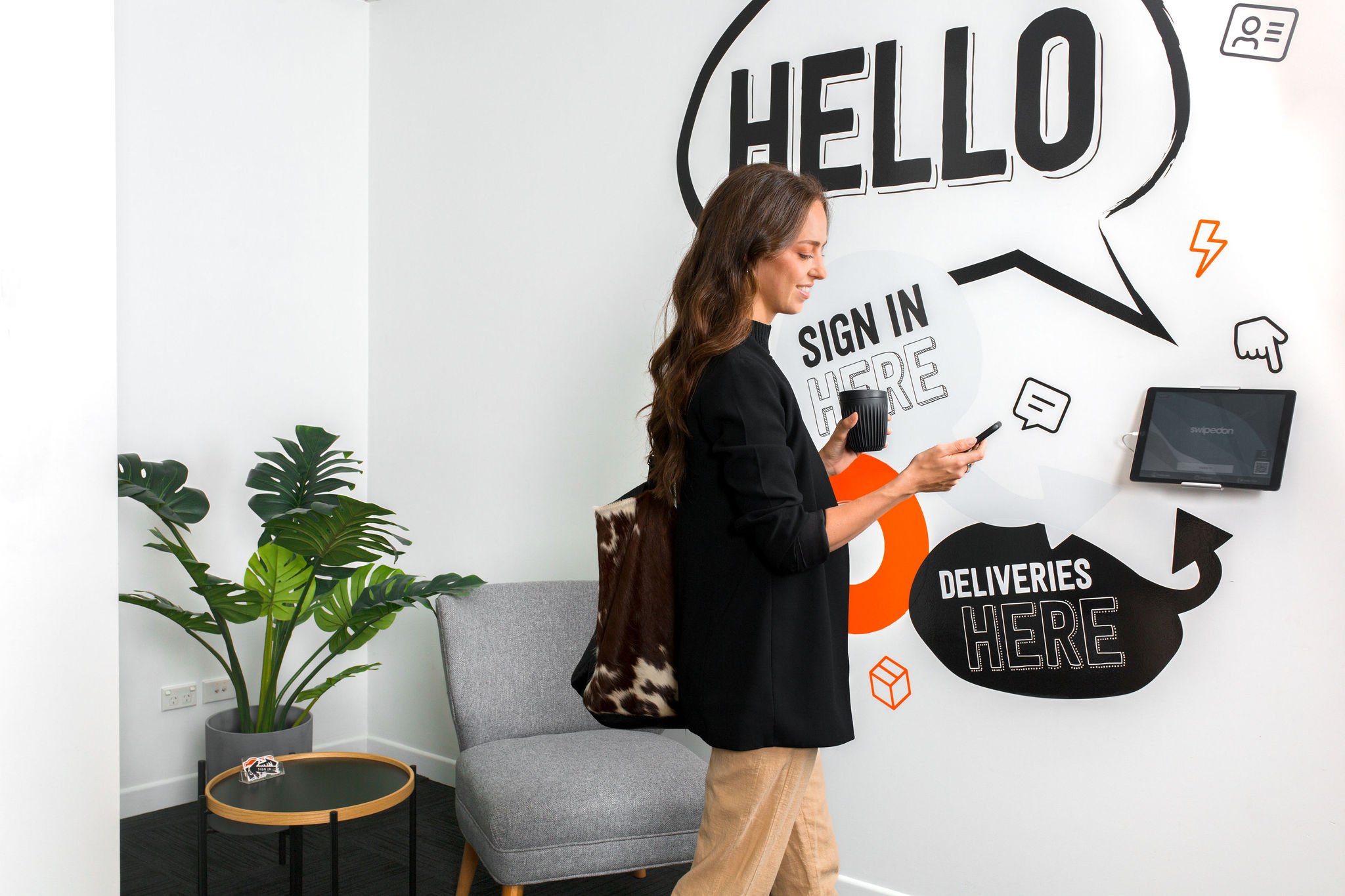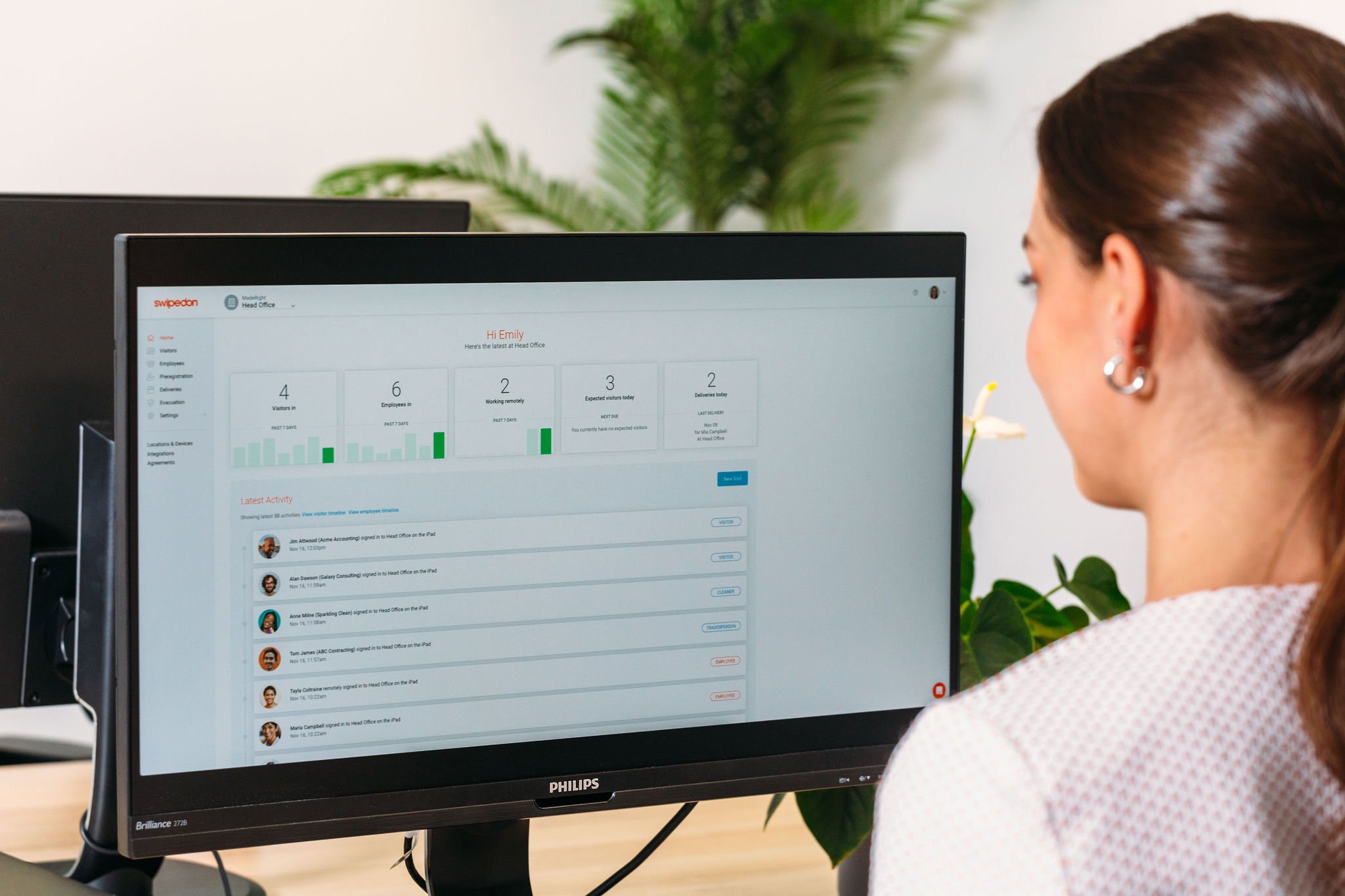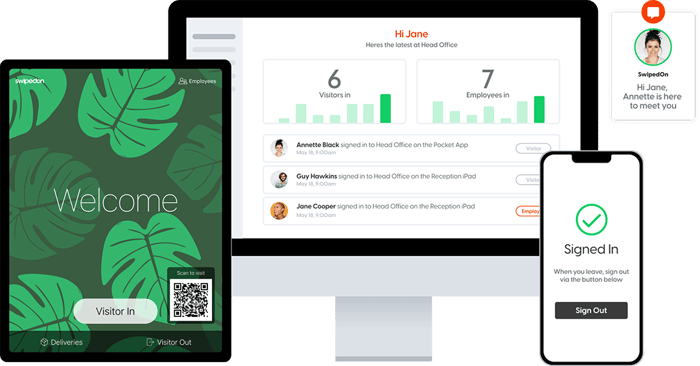Is Your Visitor Management Process Compliant? Why Paper Logs Fall Short

Believe it or not, asking your office visitors to sign your paper logbook can cost you hefty fines — up to £20 million to be exact.
Data privacy laws such as Europe’s GDPR, Canada’s C-TPAT, Australia’s Privacy Act and more than 20 different state-specific regulations in the US have all been enacted in recent times, changing the expectation for businesses in a range of settings.
While many of these regulations have been in place for some time, it’s not always easy to keep up. One study found more than 90% of businesses are not compliant with the latest privacy requirements, noting many of these still use manual processes that are also time consuming and error-prone.
The humble log book is a common example of this. Privacy laws don’t distinguish between online or offline data - any personal data in any form is required to be kept private. Visitor sign in books are a clear example of a violation of privacy in any jurisdiction.
Different countries, regions and states all have different data privacy regulations, and there are a range of ways manual log books may be non-compliant.
In this video, sales executive Mark guides you through five key features to consider when choosing a visitor management system. Listen to point number three in relation to GDPR.
Want to see more? Subscribe to the SwipedOn YouTube channel: here
Common Problems with Paper Visitor Books
Physical log books may seem innocent enough, but in an age where personal information can be highly valuable in the wrong hands, it presents a very real privacy risk.
There are a variety of ways in which manual sign in books are no longer appropriate in today’s climate:
- They can be physically stolen, granting thieves the information of anyone who’s signed it
- It’s difficult to fully obtain and record the consent of people signing it
- Information cannot be kept private; any subsequent user can see details of those who’ve signed the book before them
- It’s difficult to find and delete visitor data
All of these are requirements under today’s privacy laws. While different countries and states have their own specific expectations, these are common examples of violations.
How Digital Systems Solve These Problems

With an advanced visitor management system that electronically collects and stores visitor data in the cloud, it is easy to search for a specific person’s information and delete it, either when a visitor requests it to be (as they are entitled to do) or after a set period of time.
A digital tool improves your compliance by keeping personal information hidden from subsequent users; be they other visitors or staff members that would otherwise handle the written log book.
For example: Co-working spaces
Shared office spaces commonly have a centralized sign in book that is managed on behalf of the individual tenants. However, tenants have much less control over these log books and the information they contain.
Log books are managed by the front desk administrators, so you are immediately sharing the information of your guests with an outside party. Again, this also creates issues with consent and the erasure of data.
But with a digital visitor management system, the front office can still manage the sign in and out process, without keeping or being able to access the data in an improper way.
Simple Steps to Move from Paper to Digital
When you’re looking to onboard a new digital VMS, it pays to look beyond just functionality. Yes, it needs to work smoothly and as intended, but it’s also crucial it complies with data privacy regulations in your area.
Violating privacy laws can be a hugely expensive business. European businesses that fail to comply with GDPR can be fined up to €20 million or more. In the United States, one notable violation by Facebook saw them fined $5 billion.
Ask your VMS provider for proof of their compliance with the relevant regulations. If they do comply, they’ll be more than happy to show their credentials. If they don’t, then consider that a red flag.
Similarly, ask about their onboarding process, including how they get staff on board with using the new system. A best practice VMS should have:
- Accessible customer support for any troubleshooting
- Easy customization to your workplace, allowing you to create a visitor experience that reflects your brand
- An app that allows staff to control sign in from their phone
- The ability to connect with your label printer
Other Benefits of Going Digital
Adopting a digital VMS is not only the best way to ensure compliance with privacy law, but there are many other significant advantages.
It allows you to:
- Increase efficiency with your visitors, including with pre-registration, real time notification of their arrival and streamlining sign in processes.
- Improve physical security by preventing unauthorized visitors from accessing your workplace beyond the entry lobby.
- Create a better experience for visitors, by cutting wait times, streamlining sign in processes and customizing branding and tone to match your organization.
- Use visitor data to improve your facility, including by recognizing peak traffic times, preventing issues booking shared spaces and gaining further insights into visitor trends that allow you to optimize processes.
When visitors come to your workplace, the sign in process is the very first thing they do. A digital VMS can impress them and immediately set the tone for their experience, positioning your organization as a modern, tech-enabled workplace that prides itself on creating positive experiences.
Common Questions About Digital Systems

How much will it cost?
There’s no denying a digital sign in system will cost you more than the few dollars you spend on a manual sign in book. But it’s an investment in the efficiency of your business and the experience you create for everyone who comes to your workplace.
The return on investment for a digital VMS can be seen in a handful of different ways:
- Reduced admin costs by using automated technology that doesn’t require staff time. For a business with 10 locations, this is calculated to save you more than US$23,000 per year in total.
- Improves operational efficiencies with reduced wait times, real time notifications and automated procedures.
- Reduction of risk, particularly in data privacy compliance, but also in the event of an emergency.
How do I handle visitor data?
Any good VMS will have built-in features that make it much easier to ensure visitor data is kept in such a way that complies with your data privacy regulations.
In the case of SwipedOn, its anonymization feature does a lot of the hard work for you. With anonymization switched on, you can store names, company names, and custom fields in a format that does not make these details identifiable.
You can also delete the person’s photo, visitor agreement and signature, as well as all other details after a period of time, as required by law.
How do I set it up so it’s easy to use?
With any new digital system, a simple onboarding process helps to encourage uptake and optimize its use.
SwipedOn is available through an app as well as on a web browser. Both are specifically designed to be easy to operate, including for those using it for the first time.
If they aren’t pre-registered, visitors can follow an easy sign in flow on the ipad at your office, or scan a QR code and do it on their phone.
It’s just as easy for employees, who have an even more streamlined process given they’re in the office more regularly.
“Our clients and contractors are always commenting on how quick and easy it is to sign in when they visit - what more could you want!” - Rosa, Administrative Assistant, STERIS.
Read more: How SwipedOn provides STERIS with an effective, user friendly and secure visitor management system
It’s Time to Retire the Paper Visitors’ Book

From where we stand, the paper visitors book is overdue for retirement. It’s simply not fit for purpose anymore, both from a privacy perspective and as an experience for your visitors.
A digital visitor management system is an excellent way to distinguish your workplace from others. By having a slick, modern, easy to use sign in process, you can signal to your visitors that you are a forward-thinking, contemporary organization.
On the other hand, if you’re still rocking a pen and paper to sign in and out with, that also sends a message about your business to your guests.
SwipedOn provides a digital visitor management system that has welcomed millions of visitors for thousands of businesses all over the world. Our visitor management specialists are dedicated to helping support your compliance with data privacy laws, enhancing your brand and visitor experience.
Our digital solutions show our deep passion to reduce paper waste and we plant a tree for every customer who joins SwipedOn. Find out more about how to get started or sign up for a 14-day free trial.









 Germany - Deutsch
Germany - Deutsch